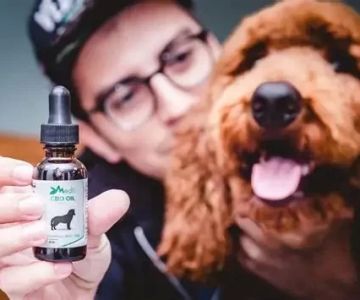Understanding Dog Anxiety and Its Triggers
Dog anxiety is more common than many owners realize. Just like humans, dogs can experience fear, stress, and emotional tension due to various environmental or biological triggers. Common causes include thunderstorms, fireworks, separation from owners, vet visits, or even changes in the household routine. Recognizing these signs early is essential for your pet’s well-being and can prevent destructive behaviors, excessive barking, or health deterioration.
How to Identify Anxiety in Dogs
Typical signs of anxiety include pacing, trembling, panting, whining, excessive licking, or sudden changes in appetite. Some dogs may hide or become aggressive, while others develop physical symptoms such as diarrhea or loss of fur. Behavioral patterns differ across breeds, but the emotional core is the same: an anxious dog needs comfort, consistency, and, in some cases, supplemental support to restore balance.
How Supplements Help Manage Canine Anxiety
Supplements for managing dog anxiety work by supporting the nervous system, promoting serotonin balance, and reducing cortisol levels—the hormone responsible for stress. Unlike prescription medications, many of these supplements use natural ingredients that calm without sedating your dog. When combined with proper training and environmental adjustments, they can dramatically improve your dog’s emotional health.
Veterinary Insights on Safe Supplementation
At Hidden Brook Veterinary 【 】, professionals emphasize that supplements should always complement, not replace, behavioral strategies. The key is to match the right formula to your dog’s temperament and health condition. Consulting a veterinarian ensures you select products free from harmful additives and compatible with any existing treatments your dog may be receiving.
Top-Rated Supplements for Managing Dog Anxiety
Let’s explore some of the most effective and vet-approved options available in the U.S. market. Each supplement works differently depending on your dog’s needs, so understanding their ingredients and benefits is crucial.
1. L-Theanine: The Calm Mind Compound
L-Theanine, an amino acid derived from green tea, promotes relaxation without drowsiness. It helps boost dopamine and serotonin production, leading to improved mood stability. Many dog owners have noticed reduced reactivity to triggers like doorbells or car rides after a few weeks of consistent use.
2. CBD Oil: The Popular Natural Solution
CBD (cannabidiol) is extracted from hemp and has gained popularity as a natural calming aid for pets. Studies suggest CBD interacts with receptors in the endocannabinoid system to promote balance and reduce stress. Always choose THC-free products specifically formulated for dogs. Start with small doses and monitor responses carefully—CBD works best when introduced gradually under veterinary supervision.
3. Melatonin: For Nighttime Anxiety
Melatonin is particularly effective for dogs who suffer from nighttime restlessness or noise phobias. It helps regulate sleep cycles and can be useful during fireworks or thunderstorms. However, dosage accuracy is essential; always confirm the correct amount with your vet to avoid lethargy or hormonal imbalances.
4. Chamomile and Valerian Root: Herbal Relaxants
Both chamomile and valerian root have mild sedative effects that calm nerves naturally. Chamomile supports digestion and eases tension, while valerian root acts on the GABA receptors to promote relaxation. These herbs are often found in calming chews and herbal blends approved for dogs.
5. Magnesium and Vitamin B Complex: Supporting the Nervous System
Magnesium helps regulate nerve impulses, while B vitamins support brain and adrenal function. Dogs with chronic anxiety often have nutrient deficiencies, so restoring balance through supplementation can help improve focus and reduce panic episodes. These nutrients also contribute to healthier coats and better overall vitality.
Real-Life Stories: When Supplements Changed a Dog’s Life
Consider the case of Bella, a rescue Labrador who developed separation anxiety after being adopted. Her owner tried various behavioral techniques but saw minimal improvement. Upon introducing an L-Theanine and magnesium supplement, Bella’s pacing and whining decreased noticeably within two weeks. The combination of supplements, structured walks, and consistent reassurance helped her regain confidence and calm.
Similarly, Max, a small terrier terrified of thunderstorms, benefited from a CBD and chamomile formula recommended by his veterinarian. Instead of shaking uncontrollably during storms, he now curls up calmly beside his owner. These stories highlight that supplements, when used responsibly, can offer lasting emotional relief for anxious pets.
How to Choose the Right Supplement for Your Dog
Selecting the best supplement involves understanding your dog’s specific triggers, age, and health background. For example, older dogs may benefit more from magnesium-rich formulas that also support joint health, while puppies might respond better to gentle herbal blends. Avoid products with artificial colors or sweeteners, as they may cause digestive irritation.
Consulting Professionals for Guidance
Every dog is unique, and supplement effectiveness varies. Schedule an evaluation with Hidden Brook Veterinary 【 】 to discuss tailored options. A veterinarian can recommend safe brands and adjust dosages to match your dog’s breed and weight. They can also help integrate supplements with behavioral therapy or desensitization techniques for more holistic results.
Additional Strategies to Support an Anxious Dog
While supplements play an essential role, lifestyle factors greatly influence your dog’s mental state. Consistent routines, gentle training, and plenty of exercise help reduce anxiety naturally. Interactive toys, calming music, or pheromone diffusers can further enhance your dog’s sense of security. Combining these methods with vet-approved supplements ensures a well-rounded approach to canine wellness.
Building Trust and Connection
Never underestimate the power of human companionship. Dogs mirror their owners’ emotions—if you stay calm and patient, your dog will too. Reward calm behavior with gentle praise, and provide safe spaces during stressful events. Over time, with consistent care and the right supplements, your dog can enjoy a happier, balanced life.
Final Thoughts: Helping Your Dog Live Stress-Free
Managing anxiety in dogs isn’t just about reducing symptoms; it’s about nurturing emotional resilience. With the right combination of nutrition, supplements, and professional guidance, even the most anxious dogs can rediscover comfort and confidence. For personalized advice, visit Hidden Brook Veterinary 【 】 to explore top-rated supplements and holistic care options designed to keep your furry companion relaxed, healthy, and thriving.












